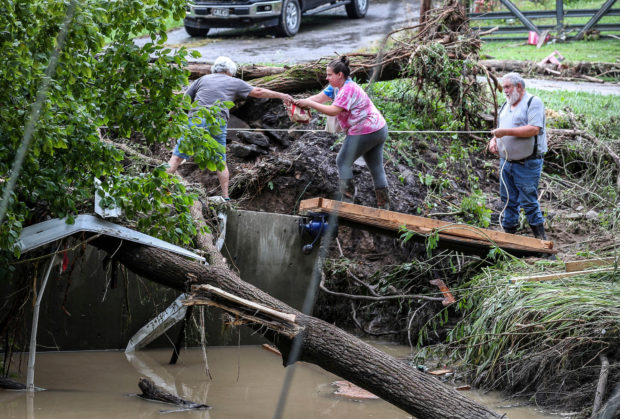
Tonya Smith, whose trailer was washed away by flooding, reaches for food from her mother Ollie Jean Johnson to give to Smith’s father, Paul Johnson, as the trio used a rope to hang on over a swollen Grapevine Creek in Perry County, Kentucky, U.S. July 28, 2022. Matt Stone/USA Today Network via REUTERS
The death toll in eastern Kentucky rose to at least 16 on Friday as flooding unleashed by “epic” torrential rainfall swept through homes, washed out roads and pushed rivers over their banks, state authorities said, warning that more fatalities were expected.
Police and National Guard troops, including personnel from neighboring states, used helicopters and boats to rescue dozens of people from homes and vehicles in Kentucky’s Appalachian coal-mining region. Video from local media showed floodwaters reaching the roofs of houses and turning roads into rivers.
“This isn’t over. While we’re doing search and rescue, there are still real dangers out there,” Governor Andy Beshear told a morning news conference.
After a helicopter flyover of the hardest-hit areas with Deanne Criswell, head of the U.S. Federal Emergency Management Agency, Beshear said he was stunned by the scope of the flooding.
Most of Jackson, a town of 2,200 people about 100 miles (160 km) southeast of Frankfort, the state capital, was submerged, he said.
“Hundreds of homes, their ballfields, their parks, businesses, under more water than I think any of us have ever seen in that area,” he told reporters. “Just devastating.”
The floods marked the second major national disaster to strike Kentucky in seven months, following a swarm of tornadoes that claimed nearly 80 lives in the western part of the state in December.
Beshear said the number of confirmed flood-related fatalities on Friday rose to 16 from 15, including at least six children, and that the death toll would almost certainly climb as floodwaters recede and search teams find more bodies.
“There’s still a lot of people unaccounted for,” he said, declining to quantify the number missing. “We may be updating the count of how many we lost for the next several weeks.”
The floods resulted from downpours of 5 to 10 inches (13 to 25 cm) of rain that fell over the region in 24 hours, a deluge that may prove unprecedented in the region’s record books, said William Haneberg, an environmental sciences professor and director of the Kentucky Geological Survey.
“It’s a truly epic event,” Haneberg said.
The disaster came two weeks after rain-triggered flash floods inundated the riverfront Appalachian community of Whitewood in southwestern Virginia near the Kentucky border.
The region’s steep hillsides and narrow valleys make it prone to flooding, but the increasing frequency and severity of rain-caused floods in the Appalachian region are symptomatic of human-induced climate change, Haneberg said.
Flood events “are going to be more extreme and frequent, but it’s hard to predict how extreme and how frequent they will be in the future,” he said in an interview.
A valley lies flooded as seen from a helicopter during a tour by Kentucky Governor Andy Beshear over eastern Kentucky, U.S. July 29, 2022. Office of Governor Andy Beshear/Handout via REUTERS
‘Everything is gone’
In Garrett, Kentucky, a coal-mining town about 125 miles (200 km) east of Lexington, brown floodwaters swirled through a commercial street and backed up against storefronts, video clips showed. Rescue boats carried people wearing life jackets along the submerged street, past the tops of vehicles poking through the high water.
“Everything is gone,” Garrett resident Rachel Patton told WCHS-TV as she cried. “We had to swim out and it was cold. It was over my head. It was scary.”
At least 300 people in Kentucky have been reported rescued by emergency crews, Beshear said. That number will likely climb, he said, considering that more than 100 people alone have been saved in National Guard airlifts.
Authorities went door-to-door on Thursday in a low-lying area of Jackson, evacuating people after inspectors noticed a discharge seeping from the nearby Panbowl Lake Dam.
“Late last night and early this morning, we thought that a real breach was imminent,” Beshear said, adding that officials were a bit more optimistic by Friday morning.
On Friday afternoon, some 22,000 homes and businesses in Kentucky and 2,200 in West Virginia were without power, according to Poweroutage.us. Widespread outages to natural gas service, water treatment and communication networks were also reported, the governor said.
Flood warnings and watches remained in effect throughout the day for the eastern half of Kentucky, as well as northeastern Tennessee and western West Virginia, where more rainfall was expected to swell waterways already well above flood stage, the National Weather Service said.
The North Fork Kentucky River at Jackson crested more than 14 feet (4 meters) above flood stage, a record, early Friday, according to government monitors.
As much as a foot (30 cm) of rain has fallen in parts of the region over the last week, according to the weather service.
President Joe Biden declared a major disaster in Kentucky on Friday, allowing federal funding to be allocated to the state.
West Virginia Governor Jim Justice declared a state of emergency on Thursday for six counties in his state, where heavy rains caused flooding that disrupted drinking water systems and blocked roads.
RELATED STORY:
Eight dead in ‘devastating’ Kentucky flooding